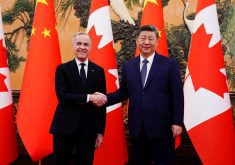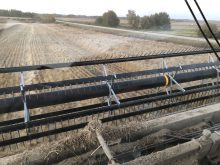“This too shall pass” is a Persian proverb used to encourage hope when times are difficult.
Does this saying apply to the current United States president’s confrontational approach to allies and friends? Does it apply to the Trump administration’s isolationist trade policies and tariffs? It probably does apply in the long term but, today, hope is in short supply for many Manitoba farmers.
Manitoba exports about $9.3 billion worth of agriculture and food products every year. This represents 13 per cent of the province’s annual gross domestic product (GDP). Almost half of these exports, 46 per cent in 2024, were shipped into the U.S.
Read Also

Farm trade policy pundits lay CUSMA odds
What’s the future of Canada’s free trade agreement with the U.S. and Mexico? Policy experts try to read the stars on the issue
On March 4, U.S. President Donald Trump carried through on his threats to put tariffs of 25 per cent on almost all Canadian exports (outside of oil and gas). This means that half of our agriculture and food exports became 25 per cent more expensive, with no return to farmers or processors. The negative impact of this will reverberate throughout every community in Manitoba, large and small.
Tariffs do not come as a surprise. The president talked about tariffs throughout his election campaign. The current U.S. administration views trade surpluses as a foreign subsidy provided by U.S. taxpayers. The president’s closest economic advisors are advocates for tariffs for both revenue generation as well as a tool to drive manufacturing to the U.S.
Given these views, it is likely that these tariffs will be with us for some time.
Many are predicting that a recession is coming and, looking at the pork sector as an example, it is not hard to see why these predictions are being made. The sector supports 22,000 jobs in Manitoba, in almost every part of the province. The industry contributes $2.3 billion to the provincial GDP. Our largest export market is now significantly disrupted, putting those jobs and economic contribution at risk.
Pork is not alone. A recent survey by the Winnipeg Chamber of Commerce found that over 60 per cent of businesses will be negatively impacted, with many seeing impacts already.
Governments need to act decisively and rapidly. We have seen positive action from the Government of Manitoba, with the premier, together with his provincial counterparts, engaging with decision makers in the U.S. Manitoba cabinet ministers, like Minister of Agriculture Ron Kostyshyn, have been reaching out to strategic partners in state capitals. The establishment of the premier’s U.S. Trade Council was a positive step. But more can, and must, be done.
At least in agriculture, we have common objectives with our neighbours in Saskatchewan and Alberta. The three governments should come together with a strategic outreach plan for Prairie agriculture and food trade stakeholders in the U.S. Through work done by the Keystone Agricultural Producers, agriculture and food value chains in Manitoba have identified 18 key states with whom we should be engaged.
It would be difficult for Manitoba to effectively launch an advocacy campaign in all 18 states, but together with the other Prairie provinces, we have the necessary resources.
The province should consider leveraging their ‘Buy Local’ campaign to partner with the other two Prairie provinces to further boost consumer demand here at home. Longer term, both the federal and provincial governments should be looking at incentives for investments that would help support export diversification and increase trade between provinces. That could include, for example, providing incentives to both farmers and processors who, considering U.S. trade actions, might want to adjust their operations to meet European regulations.
We also need to have a strategic plan going into the renegotiation of the Canada – U.S. – Mexico Agreement. The aggressive shift in U.S. foreign and trade policies over the past two months clearly show us that the renegotiation of our most important trade agreement will be difficult. We must be more prepared than we are today.
Canada has responded to the U.S. tariffs with our own duties. We really had no option. But a protracted trade war with the U.S. will weaken our province and our country for years to come. There is hard work to be done by both exporting industries, like agriculture, and governments to prevent that from happening and to recharge that hope for the future.
Cam Dahl is the executive director of the Manitoba Pork Council.















